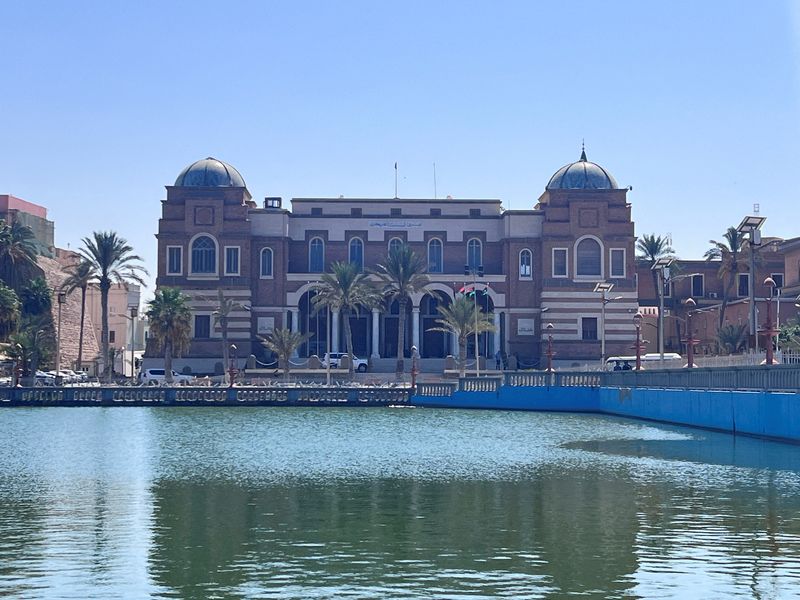Libya central bank showdown risks spiralling into wider crisis
2024.08.30 12:00
By Angus McDowall
(Reuters) – A struggle to control the Central Bank of Libya (CBL) has already sparked a blockade of oil production and it threatens the worst crisis in years for the major energy exporter, long torn between rival eastern and western factions.
The standoff was triggered when western factions moved this month to oust veteran governor Sadiq al-Kabir and replace him with a rival board, leading eastern factions to shut down all oil production.
So tangled is the situation that while Kabir retains control of the central bank’s website, a rival board appointed by the presidency council is issuing statements on the bank’s verified Facebook (NASDAQ:) page.
Kabir, who travelled abroad as the crisis unfolded, was quoted in the Financial Times on Friday saying “militias are threatening and terrifying bank staff and are sometimes abducting their children and relatives”.
The central bank has been paralysed by the brinkmanship, leaving it unable to conduct transactions for more than a week, threatening basic economic functions, and neither side looks able to back down, making violence more likely by the day.
Any move to resolve things peacefully will be complicated by a landscape fractured into rival governing institutions with tenuous claims to legitimacy, operating with few agreed rules and backed by a shifting constellation of armed factions.
Worse still, the crisis comes at a moment when international diplomacy to resolve Libya’s underlying political standoff has stalled, with the post of U.N. envoy vacant and no sign yet of foreign powers managing to rein in the rival factions.
“The equilibrium of the last two years has gone. Actors are now trying to build new leverage. So the crisis is set to get much worse,” said Jalel Harchaoui of the Royal United Services Institute.
POWER STRUGGLE
Kabir has been Libya’s central banker since the 2011 NATO-backed uprising that plunged the country into chaos, becoming a major player among the warlords and politicians endlessly jostling for power.
As the state crumbled between rival factions, the CBL and National Oil Corporation (NOC), the state energy producer, were held off limits, ensuring some governmental functions continued.
Libyan law, buttressed by international agreements, ruled that oil could be sold only by NOC, with revenue channelled into the CBL where it was used to fund state salaries and government bodies across the country.
This principle began to erode in 2022 when Prime Minister Abdulhamid al-Dbeibah installed a new NOC head in an apparent accommodation with eastern factions, leading to looser controls over the oil sector.
However, Dbeibah and Kabir fell out over spending and other issues, and the CBL governor was seen as moving closer to Khalifa Haftar, the military commander who controls eastern Libya.
By moving to replace Kabir, Presidency Council head Mohammed al-Menfi, backed by Dbeibah, has put control over Libya’s vast financial resources directly into play and neither side can easily back down.
“My overall view is that this is a political issue rather than a bureaucratic one. But it is extremely serious. Without consensus, the country’s strongest remaining institution could effectively be hollowed out,” said Tim Eaton (NYSE:) of Chatham House.
The announced dismissal of Kabir also appeared to run counter to the 2015 Libyan Political Agreement, the basis for the international community’s dealings with Libyan factions for nearly a decade.
Gaining international acceptance for a bank governor is crucial. Libyan oil revenue accruing to NOC is paid in dollars into its account at the Libyan Foreign Bank in New York before moving to the Tripoli government’s account with the CBL.
BLOCKADE
So far, the new board announced by Menfi appears unable to control CBL functions. At a news conference on Wednesday it appealed to Kabir to surrender codes that would allow it to make transfers.
It has urged Libyan banks to pay state salaries from their own reserves, promising to repay them when it gains full control over transactions. Kabir responded with a statement on the CBL website telling banks to ignore instructions from people “impersonating” board members.
If the struggle for control is prolonged, all state salaries, transfers between banks and letters of credit needed for imports will all become impossible, freezing up the economy and Libya’s international trade.
At two banks in eastern Libya, employees said clearing operations to banks in the west had stopped, along with processing of foreign remittances. State salary payments had stopped.

Meanwhile, the eastern side’s oil blockade will gradually starve the CBL of new funds, as well as reducing condensate available for power plants, meaning long electricity blackouts may soon return.
This all adds up to a miserable outlook for Libyans and raises the risk that armed factions could resort once again to fighting, some four years after a ceasefire ended the last major bout of warfare.








